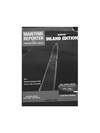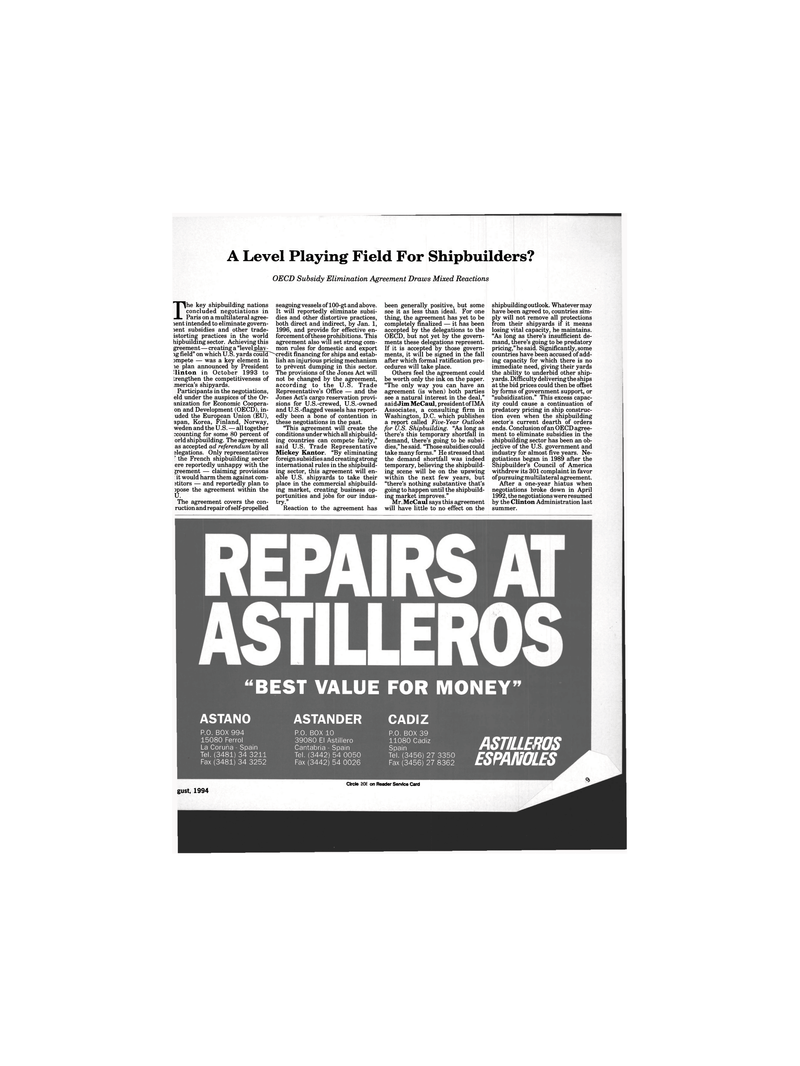
Page 1: of Maritime Reporter Magazine (August 1994)
Read this page in Pdf, Flash or Html5 edition of August 1994 Maritime Reporter Magazine
A Level Playing Field For Shipbuilders?
OECD Subsidy Elimination Agreement Draws Mixed Reactions rhe key shipbuilding nations concluded negotiations in Paris on a multilateral agree- lent intended to eliminate govern- lent subsidies and other trade- istorting practices in the world hipbuilding sector. Achieving this greement — creating a "level pla\ seagoing vessels of 100-gt and above.
It will reportedly eliminate subsi- dies and other distortive practices, both direct and indirect, by Jan. 1, 1996, and provide for effective en- forcement of these prohibitions. This agreement also will set strong com- mon rules for domestic and export lg field" on which U.S. yards could credit financing for ships and estab-
Dmpete — was a key element in le plan announced by President llinton in October 1993 to trengthen the competitiveness of .merica's shipyards.
Participants in the negotiations, eld under the auspices of the Or- anization for Economic Coopera- on and Development (OECD), in- uded the European Union (EU), apan, Korea, Finland, Norway, weden and the U.S. — all together ^counting for some 80 percent of orld shipbuilding. The agreement as accepted ad referendum by all slegations. Only representatives 7 the French shipbuilding sector ere reportedly unhappy with the greement — claiming provisions •it would harm them against com- stitors — and reportedly plan to )pose the agreement within the
U.
The agreement covers the con- ruction and repair of self-propelled lish an injurious pricing mechanism to prevent dumping in this sector.
The provisions of the Jones Act will not be changed by the agreement, according to the U.S. Trade
Representative's Office — and the
Jones Act's cargo reservation provi- sions for U.S.-crewed, U.S.-owned and U.S.-flagged vessels has report- edly been a bone of contention in these negotiations in the past. "This agreement will create the conditions under which all shipbuild- ing countries can compete fairly," said U.S. Trade Representative
Mickey Kantor. "By eliminating foreign subsidies and creating strong international rules in the shipbuild- ing sector, this agreement will en- able U.S. shipyards to take their place in the commercial shipbuild- ing market, creating business op- portunities and jobs for our indus- try."
Reaction to the agreement has been generally positive, but some see it as less than ideal. For one thing, the agreement has yet to be completely finalized — it has been accepted by the delegations to the
OECD, but not yet by the govern- ments these delegations represent.
If it is accepted by those govern- ments, it will be signed in the fall after which formal ratification pro- cedures will take place.
Others feel the agreement could be worth only the ink on the paper. "The only way you can have an agreement (is when) both parties see a natural interest in the deal," said Jim McCaul, president of IMA
Associates, a consulting firm in
Washington, D.C. which publishes a report called Five-Year Outlook for U.S. Shipbuilding. "As long as there's this temporary shortfall in demand, there's going to be subsi- dies,"he said. "Those subsidies could take many forms." He stressed that the demand shortfall was indeed temporary, believing the shipbuild- ing scene will be on the upswing within the next few years, but "there's nothing substantive that's going to happen until the shipbuild- ing market improves."
Mr. McCaul says this agreement will have little to no effect on the shipbuilding outlook. Whatever may have been agreed to, countries sim- ply will not remove all protections from their shipyards if it means losing vital capacity, he maintains. "As long as there's insufficient de- mand, there's going to be predatory pricing,"hesaid. Significantly, some countries have been accused of add- ing capacity for which there is no immediate need, giving their yards the ability to underbid other ship- yards. Difficulty delivering the ships at the bid prices could then be offset by forms of government support, or "subsidization." This excess capac- ity could cause a continuation of predatory pricing in ship construc- tion even when the shipbuilding sector's current dearth of orders ends. Conclusion of an OECD agree- ment to eliminate subsidies in the shipbuilding sector has been an ob- jective of the U.S. government and industry for almost five years. Ne- gotiations began in 1989 after the
Shipbuilder's Council of America withdrew its 301 complaint in favor of pursuing multilateral agreement.
After a one-year hiatus when negotiations broke down in April 1992, the negotiations were resumed by the Clinton Administration last summer.
BEST VALUE FOR MONEY
ASTANO
P.O. BOX 994 15080 Ferrol
La Coruna - Spain
Tel. (3481) 34 3211
Fax (3481) 34 3252
ASTANDER CADIZ
P.O. BOX 10 39080 El Astillero
Cantabria - Spain
Tel. (3442) 54 0050
Fax (3442) 54 0026
P.O. BOX 39 11080 Cadiz
Spain
Tel. (3456) 27 3350
Fax (3456) 27 8362
August, 1994 3
Circle 313 on Reader Service Card
ASTILLEROS
ESPANOLES

 2nd Cover
2nd Cover

 2
2
